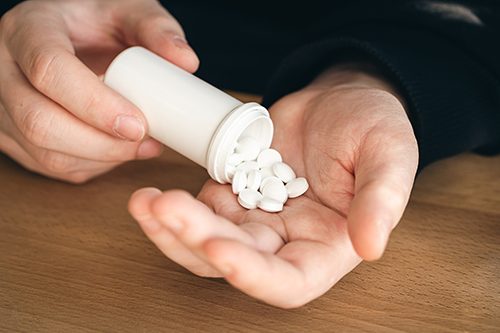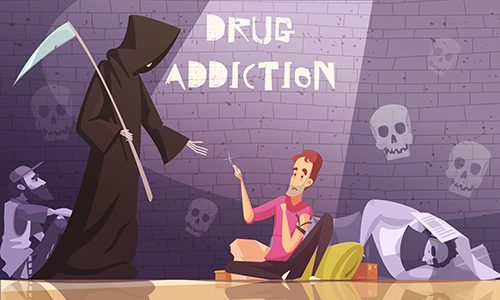Addiction is a multifaceted issue with profound implications for individuals, families, and communities across Canada. The term ‘addiction’ most commonly refers to substance addictions – a reliance on and abuse of substances such as alcohol or drugs. Numerous forms of behavioral addictions can be just as debilitating though – gambling, shopping, eating/dieting, sex, adrenaline, and so many more. Ultimately an addiction is defined as an intense craving for something, a loss of control over its use, and a continued use even when it results in negative consequences. Addictions alter brain activity by affecting the way it registers pleasure, and then corrupting motivations to satisfy that need.
It is estimated that 21% of all Canadians, roughly 6 million people, will suffer some form of addiction in their lifetimes. Depending on the severity of the addiction, the repercussions can and often do affect relationships, family, friends, finances, and employment. At its worst, addictions can result in isolation, unemployment, homelessness, and desperation. Up to 50% of young Canadians who commit suicide have a substance abuse disorder.
In this extensive guide, we will embark on a comprehensive journey into the complexities of addiction, examining its various forms, underlying causes, impacts, treatment options, prevention strategies, avenues for support and recovery, and information for aspiring community service workers.
Is Addiction a Disease?

The disease model of addiction regards it not as a moral failing or lack of willpower, but rather a complex combination of biological, psychological, and environmental factors. Recognized by leading medical and psychiatric organizations, including the American Medical Association and the World Health Organization, this model highlights addiction’s status as a legitimate medical condition deserving of compassion, treatment, and support.
What Are the Different Types of Addiction?
Addiction comes in many forms. In Canada, the leading forms of substance addictions include alcohol, nicotine, cannabis, and illicit drugs, as well as the misuse of prescription drugs, opioids, and stimulants. But it’s not just about substances – there are also behavioral addictions like gambling, gaming, internet use, and compulsive shopping. Each type of addiction has its challenges and risks. While some addictions are more obviously detrimental, all addictions can lead to serious consequences.
What Causes Addiction?

Addiction isn’t just about bad choices. It often stems from deeper issues like trauma, stress, or mental health conditions such as depression and anxiety. Genetics, childhood experiences, and social factors can also play a role. Many individuals turn to addiction as a way to cope with life’s challenges. Stressful situations or traumatic experiences can lead individuals to use substances or engage in addictive behaviors temporarily to numb emotions or distract themselves. Similarly, those grappling with underlying mental health conditions such as depression or anxiety may misuse substances in an attempt to self-medicate or alleviate distressing symptoms.
Addiction also provides an escape from unpleasant realities or adverse circumstances, offering a temporary sense of euphoria and allowing individuals to momentarily forget their troubles. Additionally, some individuals may turn to addiction in search of social connection or acceptance, especially in environments where substance use is normalized or encouraged. Moreover, addiction can stem from feelings of low self-esteem or negative self-perceptions, as individuals may use substances or behaviors to seek validation or numb feelings of shame.
Ultimately, addiction often arises from a lack of healthy coping skills to manage life’s challenges effectively. Without constructive ways to address stress, trauma, or emotional pain, individuals may resort to addictive substances or behaviors as a means of coping. Developing healthy coping mechanisms, such as seeking support from friends or family, engaging in therapy, practicing mindfulness, or finding fulfilling activities, is crucial for addressing the root causes of addiction and promoting long-term recovery. By addressing underlying issues and developing healthier coping strategies, individuals can break free from the cycle of addiction and lead fulfilling lives.
How Does Addiction Affect People?
At its core, addiction is a chronic brain disorder characterized by compulsive engagement in rewarding stimuli despite increasingly negative consequences. It is much deeper than a simple habit or indulgence, and it can fundamentally alter a brain’s neurochemistry by hijacking its reward system. When people use substances or engage in certain behaviors compulsively, it affects neurotransmitters like dopamine and serotonin.
Over time, these changes in the brain can make it hard to stop using the substance or behavior, leading to addiction. More insidiously, the initial rush that often triggers addiction typically diminishes in time, so the addict needs even more just to achieve the same sensation. The result is a relentless pursuit of substance use or behavioral satisfaction, often at the expense of personal health, relationships, and societal functioning. This highlights the importance of addressing the brain’s role in addiction when treating it.
How Does Addiction Affect Society?

Addiction doesn’t just affect the individual – it impacts families, communities, and society as a whole. It can lead to serious health problems like liver disease, cardiovascular disorders, and mental health issues – all of which put an extra burden on an already overwhelmed healthcare system. More directly, it also puts a heavy strain on relationships, decreases productivity at work, and increases crime rates.
Despite progress in understanding addiction, stigma remains a major issue. People with addiction often face discrimination and shame, which can make it harder for them to seek help. Challenging misconceptions and showing empathy are important steps in creating a more supportive environment for those in recovery.
What Treatments Are Available for Addiction?
Recovery from addiction requires personalized treatments. This might include detoxification, therapy like cognitive-behavioural therapy, medications to help manage cravings, and support from peers and professionals. Substance Abuse Centres, residential programs, counseling, support groups, and follow-up care are all important parts of the recovery process.
Addictions and Community Service Workers are often on the front line in providing support to those who desperately need it. Their jobs can have a profoundly positive effect by supporting individuals, families, and communities experiencing the effects of addiction.
There is no cure for addiction. Finding healthy outlets to focus on is often helpful for recovering addicts. Music, sports, writing, art… While it varies amongst individuals, most creative or physical pursuits are healthy alternatives that help prevent relapse.
How Can Addiction Be Prevented?

Preventing addiction involves public health efforts at various levels. Through comprehensive education and awareness campaigns, individuals can gain the knowledge and skills needed to make informed decisions about substance use and addictive behaviors. Early intervention programs play a crucial role in identifying and addressing risk factors before they escalate, providing support services and resources to vulnerable populations. Concurrently, policies aimed at limiting access to addictive substances and regulating their availability help reduce opportunities for substance misuse and addiction.
Promoting mental health awareness and resilience-building strategies equips individuals with coping skills and emotional regulation techniques, reducing the likelihood of turning to addictive substances or behaviors as a means of coping. Creating supportive communities fosters social connections and provides resources for individuals to seek help and support, as protective factors against addiction. Addressing underlying social determinants of health, such as poverty and housing instability, is essential for creating environments that support health, well-being, and resilience, ultimately reducing the risk of addiction and promoting thriving communities.
What’s New in Addiction Research and Treatment?
Addiction research is always evolving. New therapies like virtual reality exposure therapy and advances in genetics and personalized medicine offer hope for more effective treatments in the future. The chronic nature of addiction means that for some people relapse can be part of the process, but newer treatments are specifically designed to help with relapse prevention. By staying informed and supporting research efforts, we can continue to improve outcomes for people struggling with addiction.
Conclusion: Embracing Hope and Healing

In conclusion, addiction is a complex and multifaceted issue that demands a holistic and compassionate response. By deepening our understanding of addiction’s biological, psychological, and social dimensions, we can better support individuals on their journey toward recovery and healing. Let us work together to dismantle stigma, expand access to treatment, and foster resilience and empowerment in our communities.
Are you interested in pursuing a career in addiction treatment and recovery? If helping others and being a force for positive change appeals to you, a career as a Community Support Worker might be the perfect fit. ABM College offers a comprehensive Online Addictions and Community Service Worker Diploma Program that spans 56 weeks and includes a practicum for hands-on experience in the field.
Are you or someone you love struggling with addiction?
You aren’t alone.
Get help today:
- British Columbia – Substance Use Treatment Program
- Alberta – Adult Addiction Services
- Saskatchewan – Mental Health and Addiction Services
- Manitoba – Addictions Foundation of Manitoba
- Ontario – Breaking Free Recovery Support Program
- Quebec – Ami-Quebec
- Newfoundland and Labrador – Mental Health and Addiction Services
- New Brunswick – Addictions and Mental Health
- Nova Scotia – Mental Health and Addiction Services
- Prince Edward Island – Mental Health and Addiction Services
- Yukon – Canada Drug Rehab
- Northwest Territories – Canada Drug Rehab
- Nunavut – Canada Drug Rehab
About The Author

Content Editor
Stephen Emond is a published author and a content editor. He has broad experience in content development, copy editing, journalism, marketing, and information technology spanning a variety of industries. He has published a series of best selling historical reference guides covering decades of computer and video gaming history. Stephen is currently working as a Content Editor and Writer at ABM College.
